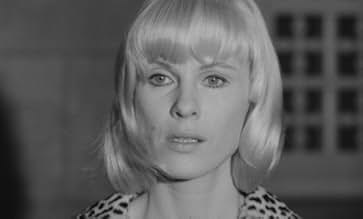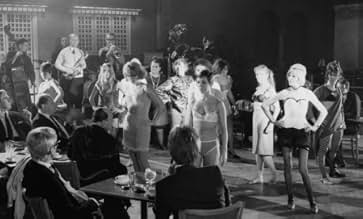Three Swedish stage actresses give differing interpretations of the classic Aristophanes play "Lysistrata."Three Swedish stage actresses give differing interpretations of the classic Aristophanes play "Lysistrata."Three Swedish stage actresses give differing interpretations of the classic Aristophanes play "Lysistrata."
Margreth Weivers
- Tourist Manager's Wife
- (as Margaret Weivers)
Signe Enwall
- Choir Member
- (as Signe Envall)
- Director
- Writers
- All cast & crew
- Production, box office & more at IMDbPro
Storyline
Did you know
- ConnectionsFeatured in Stjärnbilder (1996)
Featured review
"That's why we called a meeting of all women. We can wait no longer. Now you have to listen to us. It's our turn to talk. It's your turn to listen, just as we've had to listen in the past."
In 1968, with the world teetering on the edge of madness, Mai Zetterling makes a plea for women to stand up for themselves and start changing the world, not putting up with the status quo or their subordinate positions any longer. The premise has three women travelling as part of a theater troupe to put on a performance of Lysistrata, Aristophanes' play about women who organize to withhold sex in the attempt to get men to stop waging the Peloponnesian War, which is a perfect parallel. Zetterling interweaves the real world for these women with personal memories, fantastical daydreams, and occasional mind-reading to create a delirious blend of visual images and powerful satire.
If it's not already obvious, we see woman's perspective in many ways, but often relating to the bad behavior of men. For the two women who are married, one of their husbands immediately rings up two lovers the moment his wife leaves town, and both men have old-fashioned, condescending views about their wives working in the first place. The unmarried woman in the troupe is having an affair with a married man who makes empty promises to end things with his wife. These men all have a big laugh and yuck it up over the things the women are trying to express in the play and offstage. Meanwhile, younger men make crude comments about their bodies as the enter a restaurant, and other men aggressively try to pick them up. All of that may sound heavy-handed, but it was delivered artistically, and rang true.
Another element of this perspective is simply the presence of a crying baby, which I found refreshing given how big a part of real life this is, and how little we see it in movies. The burden of child rearing, especially when it's assumed to be the woman's priority, is well represented here, even if it doesn't make up a lot of the runtime.
There is also a fair bit of criticism about women as well, those who are too complacent or too satisfied to let others decide things in the world. In one scene where Zetterling wanders into the minds of her characters, Lysistrata (er, Liz, get it?) meets a bourgeois couple in the small northern town who agree to have dinner with her. The husband's thoughts gravitate towards her appearance like a compass needle finding north, and the wife's vary between confusion over her visitor's deep thoughts and annoyance at comments she thinks are too personal. In another moment, after a performance, Liz asks the audience to stay and discuss the play and how it relates to real life at a deeper level, but they only stare at her, dumbfounded, men and women included. "Don't you understand that it's we who make the world what it is?" she shouts to awkward silence. We also see the women break out into a fight amongst themselves, a nice little acknowledgment that peace and harmony is not necessarily a consequence of female empowerment.
If it all sounds like 'too much,' there are many wonderfully surreal moments here which helped keep the feeling of this 'message' film relatively light. One example is Liz imagining herself stripping while trying to answer reporter's questions about her behavior, showing the feelings of her vulnerability and how it's only then that men begin to show genuine interest in what she's doing. In another hilarious moment, the husband unpacks his lovers out of a large standing trunk he's brought them to the hotel in, undressing them calmly and tucking them into bed while calmly denying their existence. There are many others. It's all rendered beautifully by the black and white cinematography from Rune Ericson, and this has a very deep cast, including Bibi Andersson, Harriet Andersson, Gunnel Lindblom, Gunnar Björnstrand, and Erland Josephson, all of whom are strong here. Just a great film, still relevant today, and very entertaining.
In 1968, with the world teetering on the edge of madness, Mai Zetterling makes a plea for women to stand up for themselves and start changing the world, not putting up with the status quo or their subordinate positions any longer. The premise has three women travelling as part of a theater troupe to put on a performance of Lysistrata, Aristophanes' play about women who organize to withhold sex in the attempt to get men to stop waging the Peloponnesian War, which is a perfect parallel. Zetterling interweaves the real world for these women with personal memories, fantastical daydreams, and occasional mind-reading to create a delirious blend of visual images and powerful satire.
If it's not already obvious, we see woman's perspective in many ways, but often relating to the bad behavior of men. For the two women who are married, one of their husbands immediately rings up two lovers the moment his wife leaves town, and both men have old-fashioned, condescending views about their wives working in the first place. The unmarried woman in the troupe is having an affair with a married man who makes empty promises to end things with his wife. These men all have a big laugh and yuck it up over the things the women are trying to express in the play and offstage. Meanwhile, younger men make crude comments about their bodies as the enter a restaurant, and other men aggressively try to pick them up. All of that may sound heavy-handed, but it was delivered artistically, and rang true.
Another element of this perspective is simply the presence of a crying baby, which I found refreshing given how big a part of real life this is, and how little we see it in movies. The burden of child rearing, especially when it's assumed to be the woman's priority, is well represented here, even if it doesn't make up a lot of the runtime.
There is also a fair bit of criticism about women as well, those who are too complacent or too satisfied to let others decide things in the world. In one scene where Zetterling wanders into the minds of her characters, Lysistrata (er, Liz, get it?) meets a bourgeois couple in the small northern town who agree to have dinner with her. The husband's thoughts gravitate towards her appearance like a compass needle finding north, and the wife's vary between confusion over her visitor's deep thoughts and annoyance at comments she thinks are too personal. In another moment, after a performance, Liz asks the audience to stay and discuss the play and how it relates to real life at a deeper level, but they only stare at her, dumbfounded, men and women included. "Don't you understand that it's we who make the world what it is?" she shouts to awkward silence. We also see the women break out into a fight amongst themselves, a nice little acknowledgment that peace and harmony is not necessarily a consequence of female empowerment.
If it all sounds like 'too much,' there are many wonderfully surreal moments here which helped keep the feeling of this 'message' film relatively light. One example is Liz imagining herself stripping while trying to answer reporter's questions about her behavior, showing the feelings of her vulnerability and how it's only then that men begin to show genuine interest in what she's doing. In another hilarious moment, the husband unpacks his lovers out of a large standing trunk he's brought them to the hotel in, undressing them calmly and tucking them into bed while calmly denying their existence. There are many others. It's all rendered beautifully by the black and white cinematography from Rune Ericson, and this has a very deep cast, including Bibi Andersson, Harriet Andersson, Gunnel Lindblom, Gunnar Björnstrand, and Erland Josephson, all of whom are strong here. Just a great film, still relevant today, and very entertaining.
- gbill-74877
- Mar 1, 2023
- Permalink
- How long is The Girls?Powered by Alexa
Details
- Runtime1 hour 40 minutes
- Color
- Sound mix
- Aspect ratio
- 1.66 : 1
Contribute to this page
Suggest an edit or add missing content


































